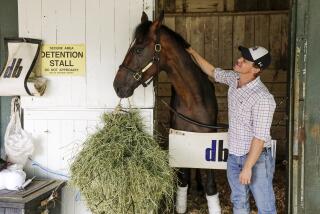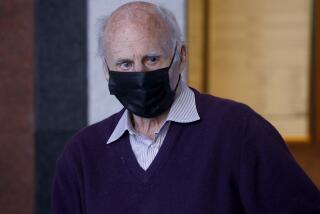Technician defends Landis work
A technician in a French laboratory who played a central role last summer in determining Tour de France champion Floyd Landis tested positive for testosterone doping, strongly defended her analyses Tuesday.
Cynthia Mongongu, an analyst at the French government doping laboratory in Paris, told a panel of arbitrators hearing Landis’ appeal that she followed standard lab procedure and made sure her equipment was in perfect working order before every test run.
Mongongu conducted the most important tests, a carbon isotope ratio assay, on Landis’ initial urine sample from Stage 17 of the race won by the American. She ruled that the A-sample was positive for testosterone doping. She also verified, or double-checked, a second analyst’s carbon isotope test on Landis’ B-sample from the same stage. That test was also ruled positive.
Mongongu testified under questioning by Daniel J. Dunn, an attorney for the U.S. Anti-Doping Agency, which is serving as prosecutor in the proceedings. She said she conducted most of the retesting in April of seven other urine samples given by Landis during the race.
The Paris lab had originally ruled those samples clean based on a simple screening test, but under the more exacting carbon isotope test, USADA says, four of the seven were found positive for testosterone abuse.
Under questioning, Mongongu said she was unaware that the sample she tested had been Landis’. The samples are customarily identified only by serial numbers in the lab.
The French-speaking lab technician also said she had not been following news about the 2006 endurance race that Landis won. “I’m not a big fan of cycling,” she testified through an interpreter.
Regarding the more recent retesting of B-samples, Mongongu said she personally handled six of 10 samples analyzed by the lab. Three of the 10 were blind samples designed to ensure the trials were random.
Landis’ defense had objected strongly to the retesting, on the grounds that the initial positive rulings meant they could never meet standards for conclusive proof of doping established by the World Anti-Doping Agency (WADA). The arbitrators allowed the retesting to take place but have not said how much weight they will give the results.
The defense is likely to question those results when it begins cross-examining Mongongu today. Her testimony and documents released by USADA during Tuesday’s session indicate that samples given by Landis after Stages 11, 15, 19 and 20 tested positive for testosterone. Samples given after Stages 2, 9 and 12 tested negative.
The positive test after Stage 17 on July 20 formed the basis for the formal contention against Landis that is now under appeal.
Landis’ attorneys are expected to seize on the fluctuating readings as a sign of the analytical shortcomings at the Paris lab, which they have contended is error-prone. They are also likely to attack what they previously have complained is the lab’s overly liberal criteria for declaring a urine sample positive for testosterone use.
The carbon isotope test is designed to measure ratios involving up to four metabolic products of testosterone found in the urine. Some leading WADA laboratories, including the Olympic Doping Lab at UCLA, measure only two and require both readings to surpass a given threshold to declare a sample positive. The Paris lab tests for all four and requires only one to exceed the trigger point. Landis contends that such a standard raises the risk of false positive readings.
Landis’ Stage 17 test recorded a positive reading on only one of the four metabolite ratios, as was the case in three of the four retested samples. In the fourth sample, two of the four readings crossed the threshold, the lab said.
Earlier in the day, Cornell professor J. Thomas Brenna, an expert witness hired by USADA, concluded testimony intended to bolster the Paris lab’s credibility. However, he appeared to do some damage as well.
For example, under cross-examination he acknowledged that in several experimental test runs the lab had failed to reproduce its analytical results with scientifically acceptable precision.
“In your lab, if you saw a difference of this magnitude [in the test results], would it cause you concern?” Landis attorney Maurice Suh said.
“I would have been concerned, yes,” Brenna said.
*
michael.hiltzik@latimes.com
More to Read
Get our high school sports newsletter
Prep Rally is devoted to the SoCal high school sports experience, bringing you scores, stories and a behind-the-scenes look at what makes prep sports so popular.
You may occasionally receive promotional content from the Los Angeles Times.






